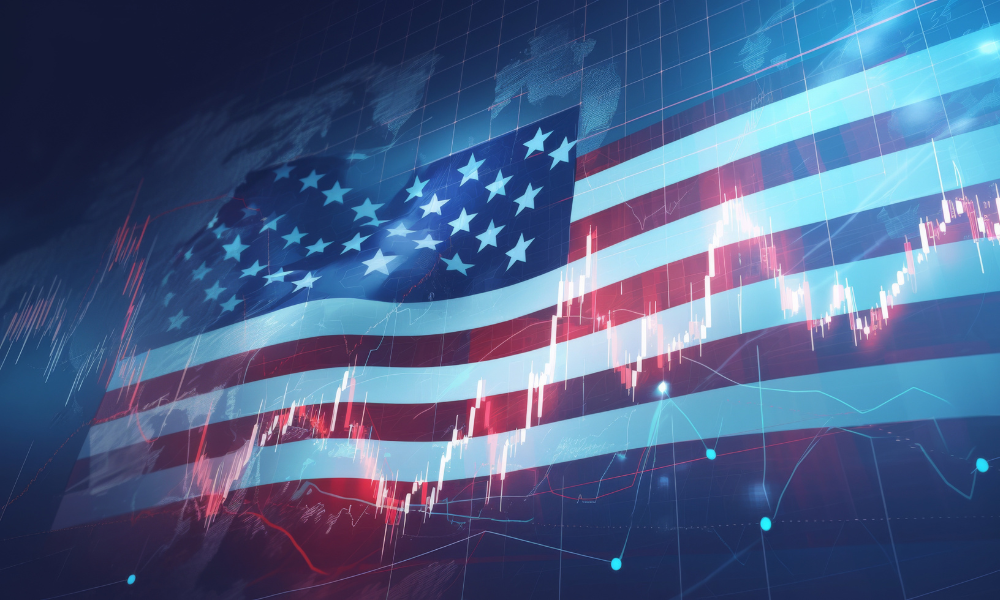

A growing number of economists and former policymakers are warning that the US economy is at heightened risk of a recession this year, as President Donald Trump’s trade policies and government restructuring efforts add to economic uncertainty.
While the biggest bearish calls now see the probability of a downturn approaching 50 percent, a few voices argue the concerns of recession are overstated.
JPMorgan’s chief global economist, Bruce Kasman, joined the pessimists' camp this week as he raised his estimate for a US recession to 40 percent, up from 30 percent earlier in the year.
That darkened outlook came as he pointed to increasing uncertainty stemming from the administration’s approach to trade, governance, and fiscal policy, according to Reuters.
"Where we stand now is with a heightened concern about the US economy," Kasman told reporters in Singapore.
While JPMorgan still projects 2 percent GDP growth for 2025, other banks have grown more cautious. Goldman Sachs now expects 1.7 percent growth, while Morgan Stanley has cut its forecast to 1.5 percent.
Kasman warned that recession risks could rise above 50 percent if Trump follows through on additional tariffs set to take effect in April, arguing that such measures could further disrupt business sentiment and economic stability.
"If we would continue down this road of what would be more disruptive, business-unfriendly policies, I think the risks on that recession front would go up," he said.
Beyond trade, Kasman also expressed concerns that investor confidence in US financial markets could break down if the administration continues to challenge long-standing norms of economic governance. He noted that shifts in federal policy, including budget cuts to agencies and changes in regulatory oversight, could weaken trust in the country’s economic institutions.
"The term which has been in place for a very long time is that we have 'exorbitant privilege'. That we end up paying a much lower cost for financing our deficits and debt, we have much greater capital flows and attractiveness of the dollar and assets, because of these things," he said.
Former Treasury Secretary Lawrence Summers went even further, placing the odds of a recession at nearly 50 percent. He cited several key risks, including immigration restrictions, federal job cuts, and a decline in US competitiveness due to Trump’s tariff policies.
"We’re looking at a slowdown relative to what was forecast, almost for sure, and a serious, near 50 percent prospect of recession," Summers said in a Tuesday interview on Bloomberg Television.
Summers criticized the administration’s protectionist approach, arguing that tariffs on imports could drive up costs for US manufacturers rather than protecting domestic industries.
"Your chances would be much better subsidizing their outputs than raising the price of manufacturers’ inputs," he said.
Much like Kasman, Summers also flagged risks from major immigration restriction, a rash of federal government layoffs – most recently including a late-Tuesday move to downsize the Department of Education by nearly 50 percent – and the impact of Trump's tariffs on US competitiveness.
The warnings come as US stocks suffer their sharpest declines in months. The S&P 500 fell briefly into a correction on Tuesday, though it regained some ground Wednesday following news of an inflation slowdown in February.
Recent consumer and business confidence surveys have also shown weakening sentiment amid trade tensions and uncertainty over economic policy.
The freshest read from the Federal Reserve Bank of Atlanta’s GDPNow tracker projects a contraction in the first quarter, though most Wall Street economists still expect modest growth for the year.
Even amid the mounting concerns, some believe the recession fears are overblown. Former Treasury Secretary Steven Mnuchin dismissed the warnings, arguing that economic fundamentals remain solid.
"I don’t think we’re going to have a recession. I don’t think the outlook looks like we’re going to have a recession," Mnuchin told CNBC Wednesday, casting doubt on Summers’ near coin-flip prediction.
Mnuchin acknowledged that market volatility and shifting trade policies have created uncertainty, but insisited "people are overreacting a bit" to the policy changes from the Trump administration. The pullback in stocks, he added, came following a period of high levels across the S&P 500 and the tech-heavy Nasdaq Composite.
“I don’t think anybody should look at what’s a natural, healthy correction of these indexes as indicating that the economy’s in trouble,” he said.

Rajesh Markan earlier this year pleaded guilty to one count of criminal fraud related to his sale of fake investments to 10 clients totaling $2.9 million.

From building trust to steering through emotions and responding to client challenges, new advisors need human skills to shape the future of the advice industry.

"The outcome is correct, but it's disappointing that FINRA had ample opportunity to investigate the merits of clients' allegations in these claims, including the testimony in the three investor arbitrations with hearings," Jeff Erez, a plaintiff's attorney representing a large portion of the Stifel clients, said.

Chair also praised the passage of stablecoin legislation this week.

Maridea Wealth Management's deal in Chicago, Illinois is its first after securing a strategic investment in April.
Orion's Tom Wilson on delivering coordinated, high-touch service in a world where returns alone no longer set you apart.
Barely a decade old, registered index-linked annuities have quickly surged in popularity, thanks to their unique blend of protection and growth potential—an appealing option for investors looking to chart a steadier course through today's choppy market waters, says Myles Lambert, Brighthouse Financial.
